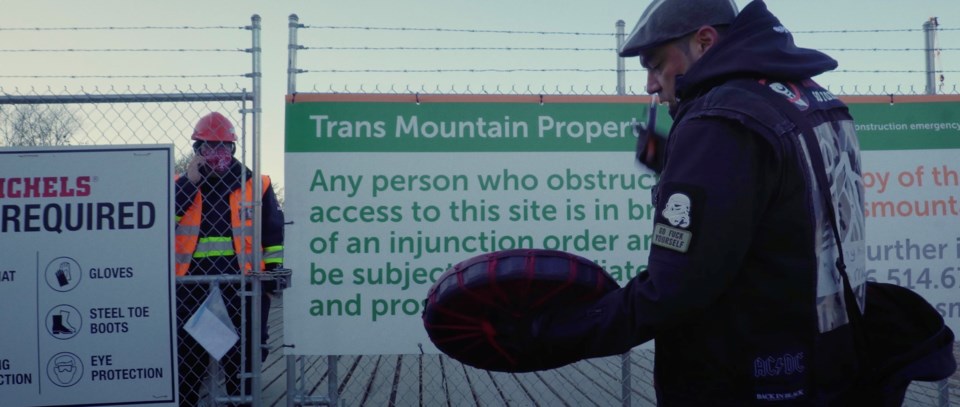Tsleil-Waututh Nation member and Burrard Inlet protector William George was sentenced to 28 days jail Tuesday (May 10) for his actions in protesting against the Trans Mountain Pipeline expansion.
The jail time follows a breach of an injunction issued by the B.C. Supreme Court in January 2021, which ordered George and others from physically obstructing or impeding access to the Trans Mountain terminal in Burnaby.
In a statement released by Protect the Planet Stop TMX, the advocacy group said that despite there being multiple people present on the day George was arrested “the Crown only brought charges against George.”
George is the first Tsleil-Waututh Nation member to be convicted for resisting “the TMX pipeline while on his own ancestral, unceded land,” the group wrote.
He was arrested while the expansion project was temporarily suspended and had never been arrested before, according to the advocacy group.
George has been a visible face in protesting the expansion project, taking a leading role in Coextinction, a 2021 documentary which looked at the impending extinction of the southern resident orcas.
“The injunction prevents water protectors and land defenders from coming within five metres of TMX work sites. For those who might not know, injunctions are a tool used to protect industry interests and criminalize Indigenous defence of unceded land,” Coextinction filmmakers wrote in support of George.
In sentencing George to 28 days jail, Protect the Planet said Supreme Court Justice Shelley Fitzpatrick failed to consider non-custodial sentencing options that were provided within George’s 16-page Gladue Report.
Gladue reports are used in pre-sentencing when an Indigenous person may face a loss of liberty. The reports include historical details about the person's life and family as a way to address the over-representation of Indigenous people in the Canadian justice and carceral system.
“Although Fitzpatrick has had the report for months, she took only a 15-minute break to scan it, after which she was ready to sentence George the same day,” the group wrote.
In a statement released Wednesday, Tsleil-Waututh Nation said it is “frustrated and dismayed” at the 28-day sentencing of George, noting that he was acting peacefully while protesting the expansion project.
“[This is] a project that puts his ancestral lands and waters and community at significant risk,” the Nation wrote. “Mr. George was upholding his sacred obligation to protect Tsleil-Waututh lands and waters. Justice Fitzpatrick provided Mr. George with the same sentence as non-Indigenous opponents of TMX, conflating environmental concerns and stakeholder rights with those of Indigenous rights, title and sovereignty.”
The Nation noted that in sentencing, Justice Fitzpatrick revealed that she did not know where TWN is located.
“The courtroom is located in the heart of TWN’s shared territory, as is TMX. The terminus of the pipeline is directly across from the TWN reserve; TWN members watch its construction from their living room windows,” the Nation wrote.
Tsleil-Waututh Nation Chief Jen Thomas said that the sentencing of George is a continuation of a long history of British Columbia criminalizing Indigenous people for defending their territory.
“Sentencing an Indigenous man to four weeks in prison for peacefully defending the territory is a disproportionate response and contributes to the over-representation of Indigenous people in the criminal justice system. This is not justice. The Tsleil-Waututh Nation stands with Will George,” she said.
The sentencing comes shortly after the United Nations High Commission on the Elimination of Racial Discrimination found Canada had violated its commitment to the UN Convention, by failing to obtain Indigenous consent for pipeline projects, for forcibly evicting Indigenous peoples from their territory, and for criminalizing Indigenous land defenders.
“The arrest and sentencing of Will George for standing peacefully for his rights goes against TWN law, international law, and Canada’s own UNDRIP law. There is no reconciliation without meaningful action,” the Nation wrote.
This article has been amended to include a response from Tsleil-Waututh Nation.


